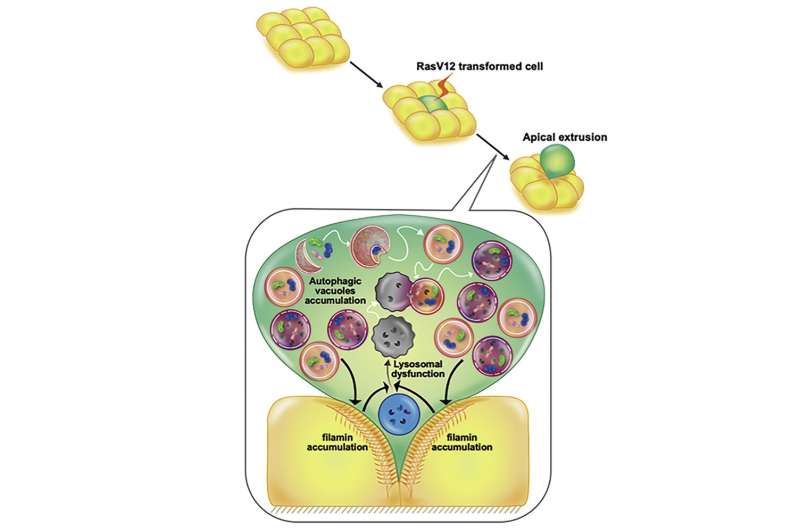Getting rid of unwanted transformed cells: Possible new directions in cancer therapy

The maintenance of a healthy cell population is a dynamic process, whereby unhealthy cells are eliminated by a defense mechanism called cell competition. This process is crucial as unhealthy cells or cells that have accumulated detrimental genetic mutations (defects in genes) over time, can initiate the formation of cancer.
Cell competition is achieved by healthy normal cells that surround mutant cancer cells through various mechanisms that trigger cell removal. In addition, epithelial cells (a type of cell that constitutes external and internal body surfaces such as skin and internal organs) adopt a cell-death-independent mechanism known as apical extrusion to recognize and eliminate transformed cells. While the role of apical extrusion in cell competition has been well elucidated, the regulatory mechanisms underlying this complex dynamic process remain elusive.
Autophagy is a process by which cells degrade and recycle cellular components. Dysregulation of autophagy has been implicated in various diseases, including several cancers. While autophagy is known to facilitate the growth and survival of cancer cells at advanced stages, previous studies have indicated that autophagy may have a preventive role in early stages of cancer. Does autophagy regulate the early destruction of cancer cells through cell competition?
Building on this hypothesis, Dr. Shunsuke Kon, a junior associate professor at Tokyo University of Science along with Eilma Akter and a team of researchers, has now explored the potential regulatory role of autophagy in cell competition, in a new study recently published in Cell Reports.
Probing deeper into the possible interplay between autophagy and cell competition, the researchers used cell lines, in which cell competition is triggered by RasV12 (a cancer-causing protein). Dr. Kon explains that they "have previously shown that when a small number of mutant cells are produced in the normal epithelial layer by activating the cancer-causing gene Ras, the mutant cells are eliminated into the lumen as loser cells. This happens as a result of cell competition between the normal epithelial cells and the Ras mutant cells."
Using the RasV12-induced mosaic (healthy + mutant cancer cells) cell competition model and fluorescent-protein labeling, the team uncovered a fascinating set of results. They showed that the RasV12-transformed cells had an increased number of autophagosomes (structures containing degradable cytoplasmic contents).
Further, they noted impairment of lysosomes, the structures that fuse with autophagosomes and mediate the breakdown of their contents; which likely, caused the increase in autophagosomes. This in turn, perturbed the autophagic flux (a measure of autophagic degradation) in RasV12-transformed cells.
Next, they showed that the accumulated autophagosomes and the impaired lysosomes facilitated apical elimination of the transformed (cancer) cells via cell competition. These results suggest that the intact or non-degradable autophagosomes are important for the elimination process.
Interestingly, when the researchers ablated the autophagy gene, ATG-5 in RasV12-induced cells, they noted impairment in autophagy mediated cell competition and elimination of the transformed cells. Similarly, autophagy impaired cells exhibited resistance to elimination in a mouse model, and eventually led to chronic pancreatitis or inflammation of ducts in the pancreas, thus, corroborating their earlier findings.
Together, these findings highlight the role of autophagy in competitive elimination of mutant cancer cells and tissue homeostasis (balance). The study sheds light on the role of autophagy in cancer prevention during early stages and opens avenues for the development of novel anti-cancer therapeutics.
In this context, Dr. Kon remarks, "The development of anti-cancer drugs targeting autophagy is being intensely pursued worldwide. Since the role of autophagy has been found to differ depending on the stage of cancer progression, anti-cancer strategies that take into account the stage of cancer progression can enhance treatment efficacy."
More information: Eilma Akter et al, Non-degradable autophagic vacuoles are indispensable for cell competition, Cell Reports (2022). DOI: 10.1016/j.celrep.2022.111292
Journal information: Cell Reports
Provided by Tokyo University of Science



















